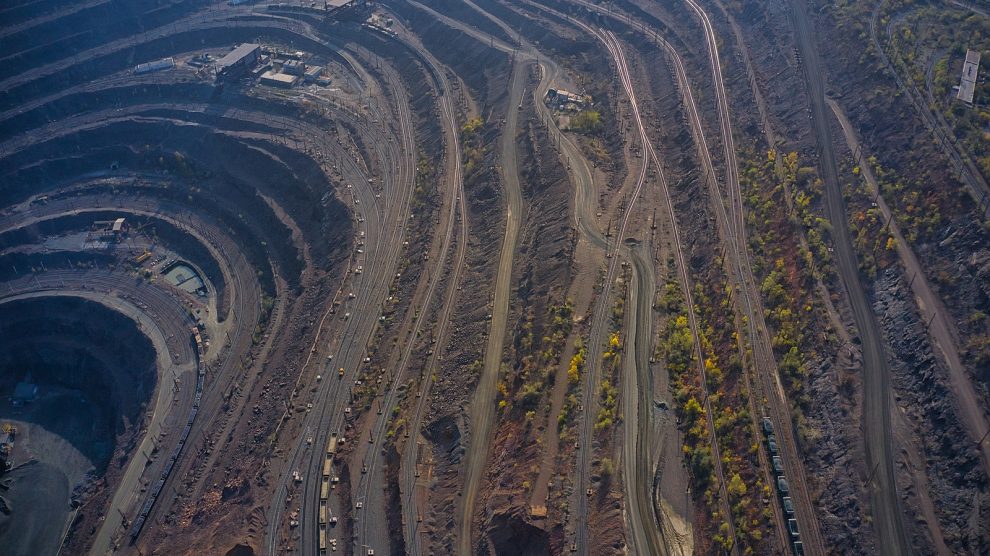A new EU-Ukraine agreement focuses on the approximation of policy and regulatory mining frameworks, notably the application of environmental, social and governance (ESG) criteria across all activities.
The European Union and Ukraine have launched a strategic partnership on raw materials, with the aim of achieving closer integration of raw material and battery value chains.
- What next for the EU’s Eastern Partnership?
- New hope for Ukraine’s iconic aircraft manufacturer Antonov
- Why Belarus is weaponising irregular migration
European Commission Vice-President Maroš Šefčovič and Denys Shmyhal, Ukraine’s prime minister, signed a memorandum of understanding underpinning the partnership on July 13. It is the second raw materials partnership the EU has signed in recent weeks, following an agreement with Canada on June 15.
The strategic partnership with Ukraine will include activities along the entire value chain of both primary and secondary critical raw materials and batteries, and in line with the objectives of the EU’s Critical Raw Materials Action Plan, it will help diversify, strengthen and secure both sides’ supply of critical raw materials, essential for achieving the green and digital transitions.
The partnership will also be decisive in preserving global competitiveness and developing resilience of EU and Ukrainian industry. It is the first tangible deliverable under the enhanced cooperation between the European Union and Ukraine in the areas of the European Green Deal and the Industrial Strategy.
ESG criteria across all areas
The strategic partnership will aim to develop three key areas of work.
Firstly, it focuses on the approximation of policy and regulatory mining frameworks, and notably the environmental, social and governance (ESG) criteria across all activities.
Secondly, the partnership aims to better integrate critical raw materials and battery value chains to develop minerals resources in Ukraine in a sustainable and socially responsible way.
To do so, it will engage the European Raw Materials Alliance and the European Battery Alliance as platforms for EU and Ukrainian stakeholders, including funding and investment organisations, to collaborate and develop joint venture projects and other business opportunities.
To this end, Vice-President Šefčovič formally accepted the membership of the Ukrainian Ministry of Ecology and Natural Resources of Ukraine to the two European industrial alliances.
Finally, the partnership also encourages closer collaboration in research and innovation along both raw materials and battery value chains using Horizon Europe.
Furthermore, the EU and Ukraine endorsed a first roadmap, a set of concrete activities and joint projects to advance the strategic partnership in the period 2021-2022.
Specifically, it will help to develop a low carbon strategy and roadmap to decarbonise raw material mining, extraction and processing in Ukraine, as well as strengthen sustainable and responsible sourcing and processing of raw materials and batteries in Ukraine by organising capacity building events for public administration and trainings for companies.
It also seeks to digitalise and strengthen data management of Ukrainian mineral resources/reserves by creating a “data room” – a repository with digital geological reports, and de-classifying and re-assessing raw materials reserves using international standards;
The deal should also enhance the use of Earth-observation programmes and remote sensing to strengthen new resource exploration, and monitor environmental performance of mines during operations and post-closure, and identify and conduct joint-venture projects for EU and Ukrainian industrial and investment actors by using Business Investment Platforms of the European industrial alliances.
Strategic partnership
The new strategic partnership was developed under the existing framework of the EU-Ukraine High Level Industrial Dialogue – Working Group on Raw Materials. This collaboration structure will also be used for monitoring and discussing the matters of relevance to its implementation. A regular biennial high-level meeting, at ministerial level, will take stock of the strategic partnership, discuss possible new collaborations and endorse future roadmaps.
“I am honoured to launch, on behalf of the EU, this strategic partnership on raw materials and batteries with Ukraine,” said Šefčovič. “This new chapter in EU-Ukraine cooperation will not only strengthen our political bond, but will also bring a wide range of opportunities for EU and Ukrainian industry – and ultimately help create and preserve local jobs in future-oriented areas, intrinsically linked to the ongoing green and digital transitions.”
Commissioner Thierry Breton, responsible for the internal market added: “I am pleased to see concrete results of the Commission’s Action plan on Critical Raw Materials. This partnership will contribute to diversifying the EU supply of raw materials and addressing some of the strategic dependencies identified in the updated Industry Policy Strategy. The high potential of the critical raw materials reserves in Ukraine, together with the need for modernisation of its extractive industry underpinned by improving the legal and administrative framework for investors and geographical vicinity, represent a solid base for the mutually beneficial partnership.”
Enlargement Commissioner Olivér Várhelyi meanwhile said: “The strategic partnership on raw materials and batteries will allow us to enhance economic links as launched under the EU-Ukraine Association Agreement, including the Deep and Comprehensive Free Trade Area (DCFTA). This will contribute to a strengthened resilience of the economy – a key aim of the recently adopted Economic and Investment Plan for the Eastern Partnership, in the implementation of which Ukraine will play an important role.”
Unlike many news and information platforms, Emerging Europe is free to read, and always will be. There is no paywall here. We are independent, not affiliated with nor representing any political party or business organisation. We want the very best for emerging Europe, nothing more, nothing less. Your support will help us continue to spread the word about this amazing region.
You can contribute here. Thank you.








Add Comment